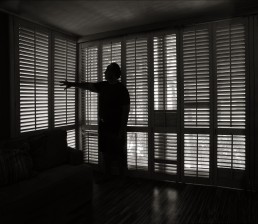S1: Episode 10 - Virgil Stinnett

Episode Information
Narrator:
Welcome to my Heart is Not Blind. Narrative histories about blindness and perception. A traveling exhibition and book published by Trinity University Press, supported by Kronkosky Charitable Foundation, edited and hosted by Michael Nye. Every person, every place is a map to somewhere else. Episode 10, Virgil Stinnett.
Virgil:
I think being around the ocean is, um, very humbling. You, you look at yourself and you’re like, I’m this tiny little dot with this vastness, the whole ocean all around you. It’s just incredible what nature is like. One minute she could be just calm and glassy, and the next moment she could be your worst nightmare. Well, when I went blind, I was out in the middle of the ocean as a commercial fisherman. We were out 900 miles out from the nearest port. It’s basically a livelihood catching, big game, big fish, tuna and swordfish. It’s rough, it’s rugged once you start fishing. I mean, you’re constantly up good 20 hours a day. Well, when it, when it happened, I was going down to, um, check the engine room. Well, it was like the lights went out. I think I was down there for, for a bed before my captain came down and he goes, Virgil, you all right? I said, yeah, turn on the lights. .
You know, he, he tells me they’re on, you know, detached retinas are, well, I kind of call it a boxer’s disease, you know, it’s traumatic blows to the head, but that did not happen. I did not bang my head. As soon as we got off the boat and offloaded, I locked myself up in a motel room. It was frightening. It was probably the scariest thing on Earth to me. I, I got pretty violent, you know, lashing out at the world, because why me? You know, why this, when you, when you lose your sight? My thought is, well, I can’t do it. And, you know, there’s, there’s no way I could do this. Can’t do blindness. Thanksgiving this year will be 20 years. I didn’t know a lot then, .
But today, I’ll tell you today, um, and, and it’s one of the things I I do in, in mentoring other blind people, is that there are opportunities. You can live a prosperous, joyful life even after you losing your sight. I listen to everything around me, people, traffic, sound change, echo change, or even the texture. And, and so I am a firm believer that everything has energy. Whether it’s, um, a dead tree to a, just a, a pole, a any object out there, gives out something. I could walk by people and not even physically touch ’em, and you could feel ’em, you know, feel their, their energy coming off of them. Talk about misperceptions, right? Walking out my door, and people would stop me and say, oh, you’re so amazing. Really? What am I doing that I’m so amazing about? That word has become a thorn on my side. I’m amazing because I know how to pick up my fork and eat, or I can walk outta my gate and walk towards the street. What gets me mad is those words that people use to say how wonderful you are because you’re living.
Anybody can be successful, have a rich, fulfilling life, and it’s not because of blindness. I’m not saying that you can see again, it’s, it’s to accept the condition that you’re in. It is who you are, but you have to first undergo your own transformation of thinking differently, and it’s transformation of one’s attitude and one’s way of thinking. My name is Virgil Stinnett. I work in the food service industry as a department of defense, food service contractor. I’m married to a wonderful woman, and her name is Katie. I live in Honolulu, Hawaii, just outside of Waikiki, close to the foot of Diamond Head. I, I met Katie at, at the Blind Center here in Hawaii called . There’s this woman also blind walking down the halls, tip tapping, and you could tell that stride is a person is walking with confidence. They know what they’re about. We had this instant connection. The winds of heaven blew us together.
Host:
This is Michael Nye, and you have been listening to a podcast of narrative histories. These voices are about the experience of vision loss close up, not from a distance. It’s about our shared humanity and our shared fragility. It’s about what we have in common, much more than our differences. Virgil said that a shift in attention and care amplifies experience. He said, “the essence of who I am today has never changed at all. It’s the closeness and bond I have with family and friends. It’s important to know who you are and where you came from.”
Join me next week. Two new episodes will be released. Please subscribe, rate, and review this podcast. You can also go to my website, michaelnye.org/podcast for transcripts and other information. There are so many ways. Different ways to experience moments to their fullest. Thank you for listening.
